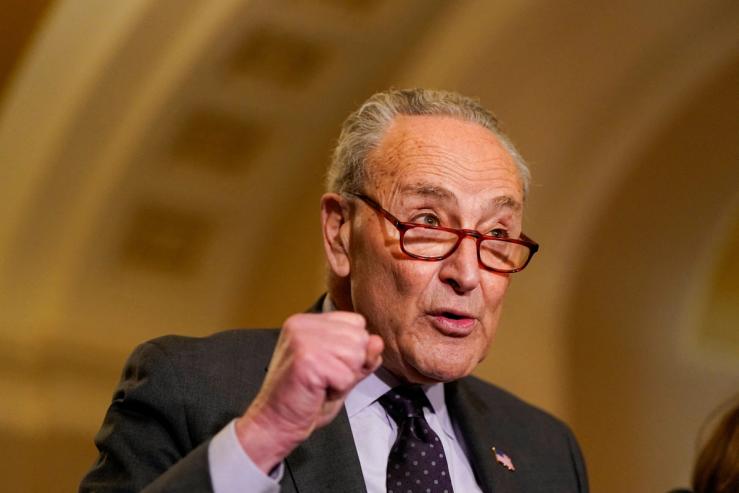The News
Republicans designed their party-line “big, beautiful bill” to deliver tax cuts now and benefit cuts later, a move that they hope shields them from midterm backlash.
Chuck Schumer has other plans.
The Democratic minority leader sees a path for his party to regain majorities in Congress — even the Senate — due to its unified opposition to President Donald Trump’s tax-and-spending bill, which is set to transform the US economy over the next few years.
“It has really put their majority at risk,” Schumer told Semafor of the Medicaid- and food stamp-cutting law in a Thursday interview at the Democratic Senatorial Campaign Committee headquarters.
“I want to show you this,” he added, handing over a chart. “This is a chart of the most unpopular acts of recent history.”
On the document, compiled by data journalist G. Elliott Morris, Republicans’ sprawling law ranks second, in between the GOP’s 2017 tax cuts and a failed attempt the same year to repeal Obamacare. It’s not just Schumer talking about the proposal’s popularity: Ahead of the midterms, Republicans acknowledge they have some work to do selling it.
Democrats see parallels to 2018 and 2006, when backlash to GOP legislation propelled them to midterm victories (although in 2018, the upside only happened in the House). They describe Trump’s tariff regime as a political storm front, on top of other effects of Trump’s megabill: Cancelled clean energy projects in purple and red states, increased health care premiums as soon as this fall from expiring subsidies, and future benefit cuts.
Schumer’s party struggled for months to effectively fight back against Trump as it worked through tactical and strategic divisions. But these days, the GOP’s success in passing its agenda is creating lockstep unity in the opposition party.
“We are going to make this the focus of the midterms, starting now,” Schumer said. “This is not one that we fight about. This is one where we’re all unified.”
Nick Puglia, a spokesman for the National Republican Senatorial Committee, said “Chuck Schumer should remember why his party does not control the current majority in the US Senate and won’t in 2027,” citing Democrats’ two party-line spending bills and Biden-era migration spikes.
Still, Republicans are taking the Democratic campaign seriously. They’re emphasizing the bill’s tax cuts for overtime and tipped workers and defending its work requirements for Medicaid.
“There’s a great offensive message that you can get out there and counter the Democrat attacks,” said Senate Majority Leader John Thune of South Dakota, Schumer’s GOP rival.
“We’ve now got a finished product to get out there and sell. And the individual components of which are incredibly popular.”
Know More
Democrats could benefit from some GOP divisions on the bill: Sen. Thom Tillis, R-N.C., has likened its political drag to the early days of Obamacare; Sen. Josh Hawley, R-Mo., says he wants to prevent some of the bill’s Medicaid cuts from ever taking place.
But pinning it to the most vulnerable GOP incumbents is a challenge. Tillis voted against the bill and is retiring. Sen. Susan Collins, R-Maine, voted to advance the bill initially but voted no in the end, citing the Medicaid cuts.
“Susan Collins enabled the bill to happen. When her vote is needed, she gives it to Trump,” Schumer said. “She let it happen.”
Back in Maine, Democrats tried to ding Collins for advancing the legislation, though she was not actually the “deciding vote” in a 51-49 roll call (Vice President JD Vance would have broken a tie if she voted no.) Shawn Roderick, a campaign spokesman for Collins, said Democrats are trying “to confuse Mainers.”
“Senator Collins voted against the budget bill. Her reasoning was clear. Now they’re trying to trick people into believing otherwise,” Roderick said.
To win back the Senate, Schumer needs to pick up North Carolina, Maine, and then some. He’ll have to win two more GOP seats in red-leaning territory, and hold open seats in Michigan and New Hampshire, plus bring back Sen. Jon Ossoff, D-Ga.
What’s more, Democrats are still waiting on former North Carolina Gov. Roy Cooper and Maine Gov. Janet Mills’s decisions on running at all.
“This is going to affect states that you never think would be affected,” Schumer predicted. “I’m not going to talk about specific candidates, but you’re seeing more enthusiasm for people running than we have before.”
Notably, there’s a good chance that whoever runs against Ossoff will be a House Republican who voted for the bill, offering a prime test case for the politics surrounding it.
“We have some 11 hospitals and rural hospitals that are imperiled by this bill, and it is a job killer,” said Sen. Raphael Warnock, D-Ga., citing clean energy projects that are now on the chopping block.
Room for Pollster Disagreement
Most mainstream pollsters find the sprawling megabill underwater, even as Republicans prepare to spend millions of dollars defending it. Democrats say connecting the bill’s cuts to food stamps and Medicaid with its tax cuts for the wealthy is the strongest message for voters.
“The argument that’s so potent is that combination: ‘You’re getting screwed’ because they are just trying to pay for these tax cuts for the wealthiest Americans,” said CEO and co-founder of Blue Rose Research Jesse Stinebring.
“One of the strongest forces in American politics is loss aversion: People worried that they’re about to lose something, or that they are losing something that they rely on,” he added. “That is the Achilles Heel of this bill.”
Republicans are testing their own messages. A poll conducted for One Nation, a group aligned with GOP leaders, found support for work requirements for Medicaid and some of the bill’s key tax provisions.
In a memo released after the bill passed, GOP pollsters Tony Fabrizio and David Lee said Democratic attacks “must be challenged by providing voters clear examples of how Republicans are defending working families from an impending tax increase, burdensome regulations, and the theft of Americans’ healthcare benefits.”
Burgess’s view
Midterm elections are typically more about the sitting president than any specific piece of legislation. But this megabill is not your typical new law. It’s poised to play a central role in both parties’ advertising campaigns.
The battle for the House is already raging, and it won’t take much to flip control to Democrats if voters sour on the bill. I still think it’s going to be tough for Democrats to take the Senate back, simply because of the composition of the battleground map, but politics is about entertaining all possibilities.
And the forceful moves by GOP leaders to defend the tax law shows they are taking Schumer’s efforts very seriously. That should tell you the 2026 battle for the Senate is real.
Notable
- Democrats are vowing to reverse the Medicaid cuts, as we reported on Thursday.
- Some Republicans want another tax cut, on capital gains, according to the Washington Post.


